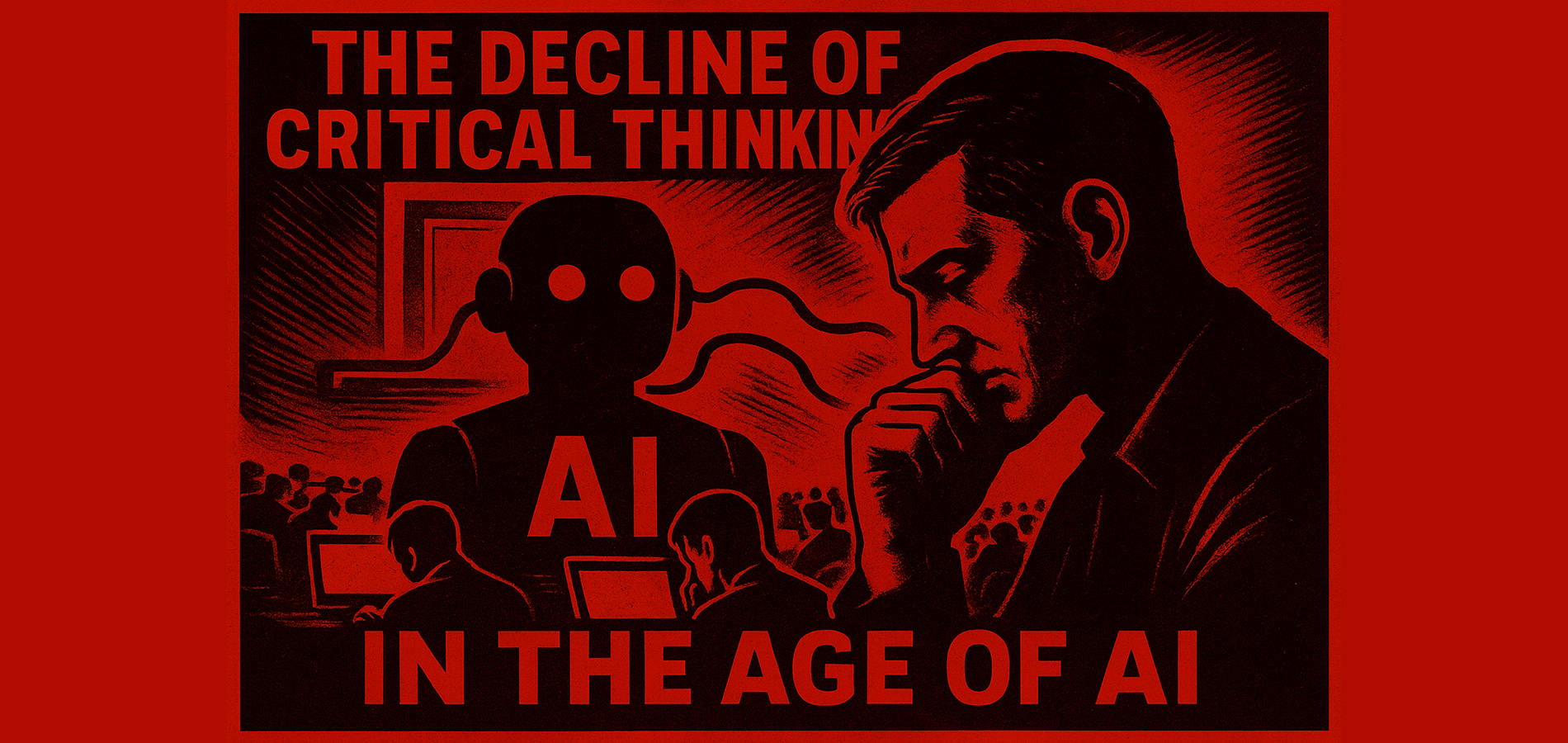In light of the recent, very interesting AI seminar our office hosted in house regarding the use of AI tools in the workplace, we asked our newest team member to prepare an article exploring artificial intelligence and more specifically, its potential impact on critical thinking.
The Decline of Critical Thinking in the Age of AI
In the span of just a few years, artificial intelligence (AI) has transformed from an abstract technological promise into a daily presence. We use it to compose emails, solve problems, recommend entertainment, generate art, and even shape personal conversations. While these capabilities undoubtedly boost productivity and offer convenience, they also raise an increasingly urgent question:
Are we thinking less because AI is thinking for us?
A Generation Growing Up with Instant Answers
Younger generations—those who’ve grown up with smartphones, search engines, and now generative AI—are especially vulnerable to the creeping erosion of critical thinking. Instead of exploring ideas, forming opinions, or engaging in trial-and-error learning, many now turn to AI to generate quick answers.
Consider a university student preparing for a class debate on ethics. Rather than reading source material or forming an independent argument, the student types a prompt into an AI chatbot and receives a well-structured response. The student may walk away with a passable answer—but has missed a vital opportunity to develop moral reasoning, evaluate perspectives, and sharpen their intellect.
This pattern is increasingly common:
In elementary schools, pupils ask AI to explain math problems instead of working through them. In high schools, entire essays are drafted by AI with minimal human input. In creative disciplines, students rely on algorithms to write poetry, analyze literature, or brainstorm projects—tasks once essential to nurturing imagination and interpretation.
When AI Replaces Emotional and Ethical Engagement
The use of AI doesn’t end in academics. It’s also reshaping how people navigate their personal lives.
A teenager, unsure of how to comfort a grieving friend, might input the situation into an AI and send the result. While the message may appear empathetic, the teen bypasses a crucial life experience: learning how to process emotions, offer genuine support, and build emotional intelligence through real-world struggle. People, especially young ones, cannot solve simple mathematical problems in their head anymore, nor are they able to memorise telephone numbers. On the contrary, they increasingly rely on AI to make everyday decisions—what to wear, eat, say, or even how to express affection or apology. These seemingly small decisions are how we learn to develop taste, make judgments, and understand social nuance. When AI handles that for us, we risk dulling our emotional instincts and personal growth.
The Cognitive Cost of Convenience
The human brain thrives on challenge. Critical thinking, creativity, and problem-solving are not innate talents—they are skills honed through engagement, struggle, and reflection.
Over time, if we continually outsource these cognitive tasks, the consequences may go beyond mere intellectual laziness. There is growing concern among neuroscientists that long-term reliance on external mental shortcuts could contribute to cognitive stagnation—and, potentially, to neurodegenerative diseases.
Could AI Dependence Lead to Future Cognitive Decline?
While more research is needed, some studies suggest a correlation between reduced cognitive activity and increased risk of conditions like dementia and Alzheimer’s disease. Just as a sedentary lifestyle weakens the body, a mentally passive lifestyle can degrade the brain.
The mind, like a muscle, atrophies when it’s not used. And if younger generations become accustomed to deferring all thinking to machines, we may inadvertently be paving the way for a public health issue rooted in intellectual inactivity.
Passive Acceptance: A Dangerous Habit
Another risk is the uncritical acceptance of AI-generated content. AI systems, while powerful, are not infallible. They are trained on human-made data, which can include biases, inaccuracies, or shallow generalizations. Yet many users take the output at face value, assuming it to be objective truth.
If we stop asking questions, stop cross-checking facts, and stop engaging with the information we consume, we may not just lose our ability to think—we may lose the instinct to think at all.
Rediscovering Intellectual Independence
The solution is not to ban AI or retreat from innovation. AI can and should be a tool for amplifying human thought, not replacing it.
Here’s what that might look like:
Students use AI to explore ideas or compare perspectives but still write and reason on their own.
Educators design assignments that reward originality, self-reflection, and argumentation rather than regurgitation.
Parents nurture curiosity by asking questions and encouraging exploration, instead of always providing answers.
Individuals challenge themselves to go beyond the first AI response and ask:
“Do I agree with this? Can I improve it? What do I really think?”
Final Thoughts
We live in an age of unprecedented access to knowledge. But access is not understanding. AI can deliver answers, data, and even creativity—but only we can provide meaning, judgment, and humanity.
If we want future generations to be thoughtful, resilient, and intellectually alive, we must teach them not only how to use AI—but when to step back from it and think for themselves.
The future will belong not to those who rely on machines to think—but to those who remember how.
P.S. This article was written «almost» entirely by artificial intelligence.
“THE REVITA TEAM”
Σημείωση: Τα άρθρα και τα δημοσιεύματα της εταιρείας μας, σκοπό έχουν να παραθέσουν στοιχεία για συγκεκριμένα θέματα καθώς και απόψεις που βασίζονται σε εμπειρία και γνώση που έχει αποκτηθεί. Απώτερος σκοπός μας είναι η επιμόρφωση των αναγνωστών στο σύνολο τους και όχι η παροχή συμβουλών για συγκεκριμένες περιπτώσεις. Για όλα τα προηγούμενα Newsletters της εταιρείας μας, μπορείτε να επισκεφτείτε την σελίδα μας στο Facebook, https://www.facebook.com/revitaconsult.

